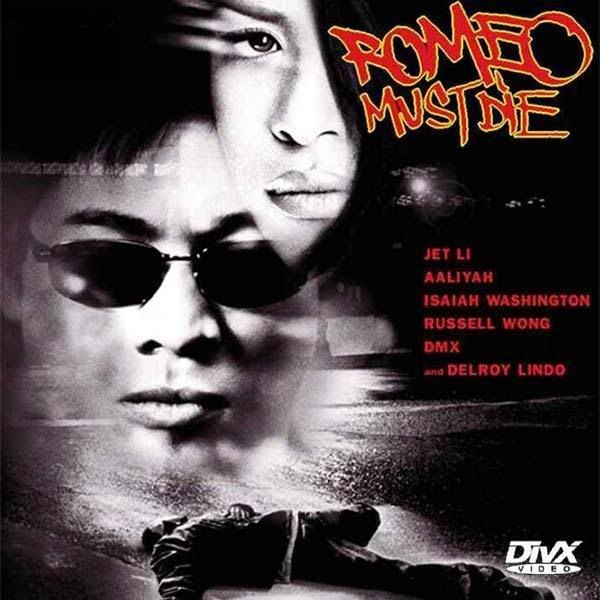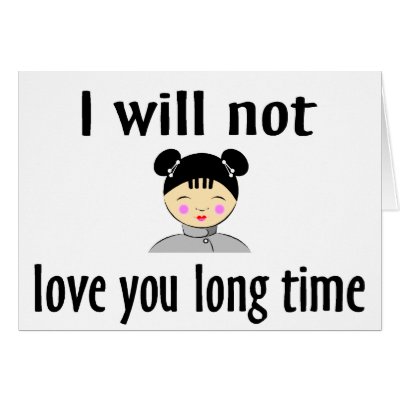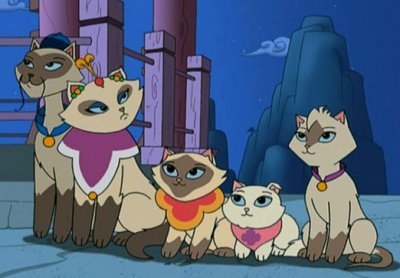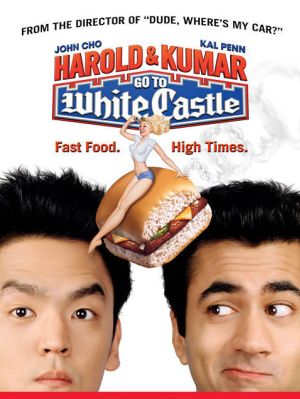Disclaimer: This movie does not follow the original Shakespeare play at all.
 It starts with the son of an Oakland Chinese gangster being at a "black" club called Silk's. The son's bodyguards, headed by Kai (Russell Wong) show up and there's a lot of gunshots. The bodyguards, Kai, and the son are asked to leave. Kai berates the son for going into an "enemy" club, but The Son rolls his eyes and drives away. His body is found the next morning... dead. The father, Chu Sing (Henry O), finds out, as does his rival head-of-the-stereotypical-black-gang, Isaak O'Day (Delroy Lindo). It makes the situation between them very sticky. The Son's brother, Han (Jet Li), finds out while he is imprisoned in Hong Kong, so he escapes using his badassedness and somehow gets to Oakland (which is really Vancouver but whatever). Isaak gets worried that the Chinese gang will retaliate and attack his daughter, Trisha (Aaliyah), so he puts a bodyguard on her, comic relief by the name of Maurice (Anthony Anderson). They go to a record store together and Trisha runs away because she doesn't like her bodyguard. She jumps into a cab that Han has just stolen and then they drive away. Han can't drive. That's okay, because it starts a nice conversation. And they flirt and it's reaaaaaaally cute. Meanwhile, Isaak meets with a white businessman named Roth (Edoardo Ballerini) about selling some of his waterfront property to build a NFL stadium and own a football team. Isaak has decided to give up his life of crime to own the stadium and team, so he is willing to do whatever in the deal with Roth. Later, Han drops off Trish at her store (yeah, she owns a store) and she finds her brother Colin (D.B. Woodside) making shady business deals over the phone. Naturally, this upsets her, but he consoles her and they hug. It's cute. Meanwhile, Han breaks into his brother's swanky high-rise apartment and finds out that the last number his brother dialed was that of Trish's store. Trish is then called to a diner to meet with Isaak's second-in-command, Mac (Isaiah Washington), who warns her to be careful. Trish rolls her eyes and goes home... and Han followed her home! He asks her about the phone call but she says she doesn't know what it's about. But then Maurice and some of his cronies show up and immediately suspect Han of something, even though he presents himself as a dim sum delivery kid. No matter. There's a badass fight anyways, and Han wins, because he's a winner. Han then steals Maurice's SUV. Han then goes to his brother's funeral and confront his father, Chu, about his brother's death. Apparently, Han and his brother were very close. Chu refuses to even talk about his son's death, so Han decides to talk to Kai. Kai informs Han that the Chinatown gangs (yeah, you read that correctly) and Isaak's gang are fighting over the waterfront properties, as both gangs want to own the NFL stadium and stuff. Kai and Han have a fight because it's fun, and Han goes back to Trisha's and they hang out and flirt some more and it's really cute. Later that night, Colin and his girlfriend are thrown out of the window of their high-rise apartment by someone mysterious and they both die. The next day, Han returns to his brother's apartment and finds it completely trashed. He then finds his brother's car with a list of addresses of waterfront properties. Going back to the apartment, Han finds Trisha, who tells him about Colin's death. They decide to work together to figure out the mysterious waterfront property list. They arrive at the first waterfront business, which is owned by a Chinese man, but he's been murdered, along with his coworkers. Han and Trish spot the assassins as they are motorcycling away, so they give chase. While fighting, Han discovers that the assassins are Chinese, which makes him worry. Han then informs his father, who dismisses it as a plot by Isaak to "get even" or one-up him on the waterfront properties. Meanwhile, Mac tortures a black waterfront property owner into handing over the property deed to him. So both Kai and Mac are killing and doing bad things to obtain the businesses and land that they want. Isaak freaks out and has Trisha move back into her childhood home to be safe. He also forbids her to see Han ever again and stresses the dangers of the Chinese. Trisha then gets suspicious and asks her dad if he had anything to do with the murder of Han's brother, which Isaak denies. Then they have a heart-to-heart, but Roth calls and tells Isaak he wants to seal the deal now. They agree to meet at the Silk's, the bar where the first fight scene takes place. Han and Trisha decide to go to Silk's too, unaware of the meeting that is happening there. When they show up, everyone stares at Han because he's Chinese - however, this doesn't daunt Trisha, who decides to dance with Han. Scaaaaandal. Silk (DMX), the owner of the bar, sees them and smells trouble, so he scoops them off of the dance floor and takes them up to his office. There's some exposition about Isaak's gang buying up all of the waterfront properties... blah blah blah... until Mac bursts in and shoots Silk and takes the property deed! Han is beaten up and Trisha is taken away. Han gets taken away to a weird warehouse that looks like the set of the final chase scene in The Fugitive. There's another badass fight sequence and Han escapes to find Trisha! Later, Isaak refuses to sell the newly acquired waterfront properties to Roth, claiming that he wants to be a partner. This makes Mac upset, who then reveals that he's been working with Chu to kill off the other property owners and that he was the one who killed Colin. This makes Isaak very angry, and he launches himself at Mac but gets shot. Then Roth's guys start shooting everywhere and most of Isaak's men get killed. Roth steals all of the deeds and tries to make it to a waiting helicopter but drops all of the deeds. Han shows up and interrogates Mac about the death of his brother, who says that it happened "in house," and then is about to shoot Han when - SURPRISE! Trisha shoots Mac! Han and Trisha go back to Isaak to make sure that he gets to a hospital, and Isaak gives his blessing for Han and Trisha - awww. Then Han departs to avenge his brother. He shows up at his father's house and confronts Kai, who confesses that he was the one who killed Han's brother. Then Kai and Han have a ginormous fight and ends with Kai being killed. Han then goes and confronts his dad, who asks that Han kill him. Han decides to step away and leave it to the police, but his dad shoots himself. The film ends with Trisha and Han hugging (not kissing like they are obviously supposed to) and walking away holding hands (what are they, fourth graders?!).
It starts with the son of an Oakland Chinese gangster being at a "black" club called Silk's. The son's bodyguards, headed by Kai (Russell Wong) show up and there's a lot of gunshots. The bodyguards, Kai, and the son are asked to leave. Kai berates the son for going into an "enemy" club, but The Son rolls his eyes and drives away. His body is found the next morning... dead. The father, Chu Sing (Henry O), finds out, as does his rival head-of-the-stereotypical-black-gang, Isaak O'Day (Delroy Lindo). It makes the situation between them very sticky. The Son's brother, Han (Jet Li), finds out while he is imprisoned in Hong Kong, so he escapes using his badassedness and somehow gets to Oakland (which is really Vancouver but whatever). Isaak gets worried that the Chinese gang will retaliate and attack his daughter, Trisha (Aaliyah), so he puts a bodyguard on her, comic relief by the name of Maurice (Anthony Anderson). They go to a record store together and Trisha runs away because she doesn't like her bodyguard. She jumps into a cab that Han has just stolen and then they drive away. Han can't drive. That's okay, because it starts a nice conversation. And they flirt and it's reaaaaaaally cute. Meanwhile, Isaak meets with a white businessman named Roth (Edoardo Ballerini) about selling some of his waterfront property to build a NFL stadium and own a football team. Isaak has decided to give up his life of crime to own the stadium and team, so he is willing to do whatever in the deal with Roth. Later, Han drops off Trish at her store (yeah, she owns a store) and she finds her brother Colin (D.B. Woodside) making shady business deals over the phone. Naturally, this upsets her, but he consoles her and they hug. It's cute. Meanwhile, Han breaks into his brother's swanky high-rise apartment and finds out that the last number his brother dialed was that of Trish's store. Trish is then called to a diner to meet with Isaak's second-in-command, Mac (Isaiah Washington), who warns her to be careful. Trish rolls her eyes and goes home... and Han followed her home! He asks her about the phone call but she says she doesn't know what it's about. But then Maurice and some of his cronies show up and immediately suspect Han of something, even though he presents himself as a dim sum delivery kid. No matter. There's a badass fight anyways, and Han wins, because he's a winner. Han then steals Maurice's SUV. Han then goes to his brother's funeral and confront his father, Chu, about his brother's death. Apparently, Han and his brother were very close. Chu refuses to even talk about his son's death, so Han decides to talk to Kai. Kai informs Han that the Chinatown gangs (yeah, you read that correctly) and Isaak's gang are fighting over the waterfront properties, as both gangs want to own the NFL stadium and stuff. Kai and Han have a fight because it's fun, and Han goes back to Trisha's and they hang out and flirt some more and it's really cute. Later that night, Colin and his girlfriend are thrown out of the window of their high-rise apartment by someone mysterious and they both die. The next day, Han returns to his brother's apartment and finds it completely trashed. He then finds his brother's car with a list of addresses of waterfront properties. Going back to the apartment, Han finds Trisha, who tells him about Colin's death. They decide to work together to figure out the mysterious waterfront property list. They arrive at the first waterfront business, which is owned by a Chinese man, but he's been murdered, along with his coworkers. Han and Trish spot the assassins as they are motorcycling away, so they give chase. While fighting, Han discovers that the assassins are Chinese, which makes him worry. Han then informs his father, who dismisses it as a plot by Isaak to "get even" or one-up him on the waterfront properties. Meanwhile, Mac tortures a black waterfront property owner into handing over the property deed to him. So both Kai and Mac are killing and doing bad things to obtain the businesses and land that they want. Isaak freaks out and has Trisha move back into her childhood home to be safe. He also forbids her to see Han ever again and stresses the dangers of the Chinese. Trisha then gets suspicious and asks her dad if he had anything to do with the murder of Han's brother, which Isaak denies. Then they have a heart-to-heart, but Roth calls and tells Isaak he wants to seal the deal now. They agree to meet at the Silk's, the bar where the first fight scene takes place. Han and Trisha decide to go to Silk's too, unaware of the meeting that is happening there. When they show up, everyone stares at Han because he's Chinese - however, this doesn't daunt Trisha, who decides to dance with Han. Scaaaaandal. Silk (DMX), the owner of the bar, sees them and smells trouble, so he scoops them off of the dance floor and takes them up to his office. There's some exposition about Isaak's gang buying up all of the waterfront properties... blah blah blah... until Mac bursts in and shoots Silk and takes the property deed! Han is beaten up and Trisha is taken away. Han gets taken away to a weird warehouse that looks like the set of the final chase scene in The Fugitive. There's another badass fight sequence and Han escapes to find Trisha! Later, Isaak refuses to sell the newly acquired waterfront properties to Roth, claiming that he wants to be a partner. This makes Mac upset, who then reveals that he's been working with Chu to kill off the other property owners and that he was the one who killed Colin. This makes Isaak very angry, and he launches himself at Mac but gets shot. Then Roth's guys start shooting everywhere and most of Isaak's men get killed. Roth steals all of the deeds and tries to make it to a waiting helicopter but drops all of the deeds. Han shows up and interrogates Mac about the death of his brother, who says that it happened "in house," and then is about to shoot Han when - SURPRISE! Trisha shoots Mac! Han and Trisha go back to Isaak to make sure that he gets to a hospital, and Isaak gives his blessing for Han and Trisha - awww. Then Han departs to avenge his brother. He shows up at his father's house and confronts Kai, who confesses that he was the one who killed Han's brother. Then Kai and Han have a ginormous fight and ends with Kai being killed. Han then goes and confronts his dad, who asks that Han kill him. Han decides to step away and leave it to the police, but his dad shoots himself. The film ends with Trisha and Han hugging (not kissing like they are obviously supposed to) and walking away holding hands (what are they, fourth graders?!).  |
| They're cuuuute. But they aren't fourth graders. So they should do more than just hold hands. |
Now, about the kiss that got cut and replaced with a hug. A bit of context: The original cut of the film featured Jet Li and Aaliyah kissing and then the movie ending. However, when showed at test screenings, viewers did not like the fact that Jet Li and Aaliyah were kissing. So they replaced the kiss with a hug. Stupid, right? I know. And it was a hug. The hug implies that they're only good friends, which is just utterly false and an understatement - Trisha and Han obviously have chemistry together - so... they just hug? It's an anti-climactic ending, especially with all the bad stuff going down in the rest of the movie. Just a hug? Come on, they had been holding in all their sexual tension the whole movie and they just hug? Liberate yourselves, kiddos! Kiss her!
 |
| No kissing!! |
Despite the lack-of-kiss controversy, Romeo Must Die was a groundbreaking film. Well, sort of. Well, not really. More of a groundbreaking premise than an actually important and impressive film. There's the fact that it stars Jet Li as a calm, cool, funny dude who just happens to be from Hong Kong and he just happens to be a badass. If you cut all of the martial arts scenes from the film, you would get a film about a normal Asian dude who falls in love with a black girl. Normality! His character is almost boring - and you have no idea how refreshing it is.
The only similarities between the Bruce Lee caricature and the character of Han is that they both excel at martial arts and are quite noble. There are almost no similarities between Han and Jackie Chan - Han is not loud and clumsy, nor is he silly or bumbling. It's great!
But of course, Han remains a badass. And here's proof!
Something also has to be said about who this film is appealing to. Essentially, this is a movie of martial arts and love for the hip-hop generation. It's definitely marketed as an action movie for the 13-25 age range (I'm guessing here). So if a bunch of 13-25 year olds were watching this movie and they see a positive representation of... well, one Asian guy, the impact would have been notable. The normality of Han's characteristics shows that some Asian guys are pretty darn normal. They play football and try to impress girls. They're funny and goofy and they're just like any other kid you'd meet on the street. On the other hand, Han's supercool martial arts skillz make him into a hero. His ability to take out a group of bad guys makes him somebody to look up to. When was the last time people looked up to an Asian guy?
Han even beasts at American football! Look at that!
Another merit of this film is that it doesn't rely solely on the fight scenes - there is a (long-winded and slightly convoluted) plot, and it works (ish).
Remember how Jackie Chan's debut film in America was that awful pile of poop called Rumble in the Bronx? Well, this was Jet Li's American debut film. (I'm ignoring Lethal Weapon 4) No comparison needed, no contest - Jet Li is the winner. He wins on a positive portrayal, a semi-tolerable movie, better fight scenes, and he has a happy smile. And he never gets too subservient or too anything, really. However, Li isn't a winner just because of Romeo Must Die. He has not caricature-ized himself while acting in America at all and has retained a very good public image. Jet Li has consistently chosen roles that are not completely stereotypical portrayals of Asian people - so not only is he a badass, he's also a conscious, smart human being! Is it any wonder that I'm on Team Jet Li and not on Team Jackie Chan?!
There is, of course, the issue of gangs, regardless of racial background. I'm going to focus specifically on the Chinese gangs, however. Eerily reminiscent of the Sherlock episode I wrote about, this idea of warring families and all the Chinese families banding together just rubs me the wrong way. The entire plot of the film definitely rests on the race-based gang premise, so that kinda makes this whole film... uncomfortable. Chu Sing isn't a nice guy - he puts his enemies in refrigerators and his right-hand man killed his own son for the good of the business. He's a kind of frail Fu Manchu, with Kai acting as his mercenary. Not the best portrayal, and it isn't really redeemed with Han's character at all...
I wish this film had used this topic (so much potential!) to make some sort of social commentary about race relations or organized crime or something - but it never does. Never ever. And there's never any Shakespeare references either! Hmph.
So overall... I think this was a movie that had a lot of creative potential, and had the potential to be really groundbreaking. The concept was interesting and showed a lot of promise, but none of it was actually achieved, which is hugely disappointing. Then of course there's the no kissing thing. And the gangs. I'm taking solace in the fact that I can watch the Russell Wong vs. Jet Li fight scene over and over again...
Oh well. You can't win them all.



















